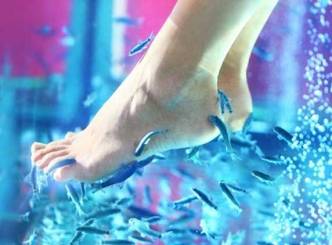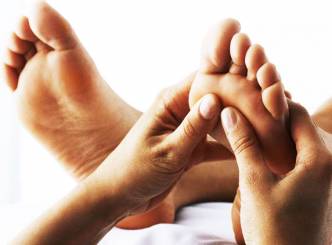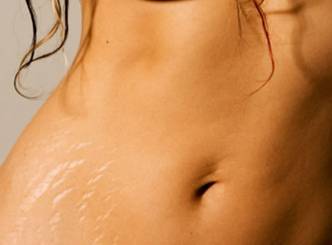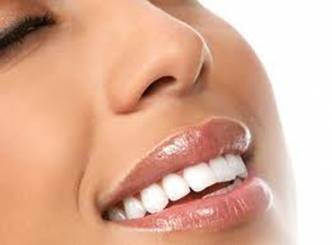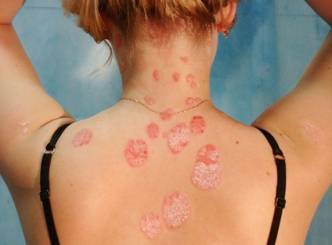Skin scaling, similar to the skin of Fish... November 22, 2012 13:32
Ichthyosis is a dry skin condition. There are two general types: Inherited ichthyosis (several forms exist)-dryness and scaling of the skin due to hereditary factors Acquired ichthyosis-thickening and scaling of the skin that is not inherited but is associated with certain medical disorders. What exactly is Ichthyosis? Our medical encyclopedia can get you started in your journey to learn more about this condition. Continue your research by clicking a new category in the left navigation. Ichthyosis is a dry skin condition. There are two general types: · Inherited ichthyosis (several forms exist)-dryness and scaling of the skin due to hereditary factors · Acquired ichthyosis-thickening and scaling of the skin that is not inherited but is associated with certain medical disordersInherited ichthyosis is caused by a genetic defect that is passed from parent to child or that occurs spontaneously. Acquired ichthyosis is relatively rare but may be caused by any of the following: · Leprosy (extremely rare in the US)· Hypothyroidism· Lymphoma ( Hodgkin's Lymphoma , Adult Non-Hodgkin's Lymphoma ) · Sarcoidosis A risk factor is something that increases your chance of getting a disease or condition. Risk factors for ichthyosis include: · Family member with ichthyosis· Cold weather· Frequent or prolonged bathing, especially in hot water· Harsh soaps or detergents· Soaps or lotions containing certain scents or perfumes The doctor will ask about your symptoms and medical history, and perform a physical exam. The diagnosis of ichthyosis is usually based on signs and symptoms of the disorder. Rarely, blood tests or a skin biopsy may be required.
Read MoreKnow the cause, before treating the problem... November 21, 2012 15:27
Before treating you skin dryness this season, know the causes of the same, apart from the climate change; Long hot showers and baths: A long hot bath or shower may sound great after being out in the cold, but the combination of hot water and soaking can strip your skin of its protective oils and leave you looking like an alligator. The solution: Try to shower or bathe in warm, not hot water, and limit showers and baths to 10 minutes, just enough to clean the dirty bits. Pat dry-don't rub-with a soft towel. Not using body lotion: It might be tempting to skip the body lotion when your skin is covered up in winter clothing, but it's just as important to moisturize in the winter as it is in the summer, even if your arms and legs aren’t on display. Dry skin can get itchy, flaky, and uncomfortable if you don't use the right lotion. The solution: Apply a rich body lotion immediately after showering to lock in moisture. Apply again before going outside and before going to bed. Look for ingredients like glycerin, which holds moisture in your skin and fights dehydration. Frequent hand washing: Dry, chapped hands are often caused by frequent hand washing, as well as the use of hand sanitizers, which often have a high concentration of alcohol. Although it’s important to keep your hands clean to avoid spreading germs, the exposure to soap and water and alcohol can strip your skin of its natural oils, leading to chapped hands, splits, and cracks that can bleed or even get infected. The solution: Carry your own moisturizing liquid hand soap. (The soap in public restrooms is often very harsh and drying.) Rub on a rich hand cream after each washing or after using hand sanitizer, and cover moisturized hands with gloves at bedtime. When gardening, doing dishes, or working around the house, wear protective gloves. Being dehydrated: You might not be as thirsty in the winter as you are in the summer months when you’re hot and sweaty. However, you lose water through your skin every day, in any season — even when it’s cold and even if you don’t feel like you’re sweating. This is especially true if you spend a lot of time in dry indoor heat. Our bodies are made of 70 percent water, which keeps our cells plump and healthy. If you’re not drinking enough, your body (and your skin) gets dehydrated, which can make you look and feel shriveled. The solution: Make sure you’re getting plenty of fluids in the wintertime, even if you don’t feel thirsty. Avoid caffeinated drinks, which will make you lose even more water. Instead, stick to water, soup, decaf coffee and tea, and herbal tea. Not eating the right foods: Your skin cells are wrapped in a protective bubble of lipids (fats) that help keep them soft, plump, and flexible. If you don't eat enough fatty acids in your diet, your body won’t have enough building blocks to maintain this protective wrap. The solution: Eating foods that contain "good fats" (especially omega-3 fatty acids) can help replenish your skin’s natural fats and keep it looking smooth and supple. Make sure to include plenty of omega-3-rich foods in your diet, including oily fish (such as salmon, sardines, and mackerel). If you’re allergic or can’t stand the taste of fish, try incorporating tofu, walnuts, flaxseeds, soybeans, or omega-3-fortified foods (like orange juice) into your diet every day. In addition, some people with dry skin and itchy rashes can benefit from evening primrose oil supplements. Wearing the wrong clothing: Scratchy fibers like wool can aggravate dry skin, especially for those who have sensitive skin or eczema rashes. In fact, if you look under the microscope, these fibers look like little pieces of steel wool that can irritate your skin, leaving it itchy and irritated. The solution: Wear cotton, silk, or other soft, smooth fabrics next to your skin to protect it from wool fibers. These natural fibers help your skin "breathe" and wick away sweat. If you must wear a wool sweater, layer a soft cotton T-shirt or turtleneck underneath. This way you can also peel off the sweater if it gets warm indoors, so you don’t overheat and sweat.
Read MoreMake your smile beautiful! November 20, 2012 15:45
By now, you probably know that lip balm can be addicting-not like how crack is addicting, although I'm sure someone's figured out a way to freebase Burt's Bees-due to ingredients that actually dry your lips out in the long run. Any lip balm that contains eucalyptus, camphor, menthol, or alcohol is grooming you for dependence. The sensation of applying cooling eucalyptus may feel good at the time, but it's only setting you up for discomfort, pain, and an unsightly inflammation of a mucus membrane. Like having a one night stand with Adam Levine. A few don'ts-don't bit the skin off of your lips and chew on it. That makes your thin lip skin even thinner and also makes you a cannibal who eats her own skin. Don't lick your lips, either-your saliva contains enzymes that help break down food, and the last thing chapped lips need is further breaking down. And if you want to get totally gross: licking your lips can do awful things like lead to a yeast infection in the corners of your mouth, or awaken a dormant cold sore (herpes) virus and then no one will want to love you or be your friend because human beings are judgmental bastards. So don't lick your lips, no matter what LL Cool J says. Vaseline is the king of fixing chapped lips. It tastes a little like butt jerky, but if you slap some petroleum jelly onto your lips, you'll lock in moisture and lock out your wayward tongue and spit. You can also use goose or duck fat, in the event that you're in a location where liquified and recongealed duck fat is available and basic lip balm is not. For people who have no interest in keeping a tub of duck fat around, olive oil can do the trick in a pinch, as can castor oil, vegetable oil, or sunflower seed oil. You could also try lard, but don't apply animal fat to your lips that will irritate your skin further. So, as delicious a solution it would be to fix chapped lips with bacon fat, don't do it. Other beauty products can be reappropriated for lip use as well, but don't use anything that contains a ton of fragrance. I've had good luck with cocoa butter and shea butter as a temporary lipmergency aid, and awful luck with heavily smelly stuff like that Victoria's Secret Love Spell lotion that I thought made me smell totally romantic if I slathered myself with it after basketball practice in high school. A column about alternatives to lip balm wouldn't be complete without the Gross Grandpa Remedy. My late grandfather, rest his soul, used to recommend applying chicken poop to heavily chapped lips. "You won't lick it then!" I've never resorted to anything that desperate, but if you have, by all means let me know if it was effective. So what's today's lesson? Lip relief can be found almost anywhere-oil, lard, buttery body creams. But you can sabotage yourself just as easily. Remember: lard, not licking. And definitely not Levine.
Read MoreCare for dry feet... November 17, 2012 13:18
Enjoy this winter rather than worrying about your feet... put them directly on the floor and enjoy the coldness... and to take care of your feet, here are the tips; Sweaty feet are soft feet, as gross as that sounds. Men often have softer feet then women simply because they wear socks more often. By wearing socks in the winter and summer months, you can keep your feet warm and moist helping moisture penetrate the dry patches on your feet. Believe it or not, night cream designed for the face is usually thicker and more moisturizing then most moisturizers. Lather it on your feet in the evening and throw some socks over it to warm the skin and allow the moisturizer to penetrate and by morning, you feet will be wonderfully soft. While you're at it, don't forget your knees, elbows and hands and soon all of your skin will be as soft as a baby’s. Feet facial: This little trick is really fun for anyone with sensitive feet. Rub a gritty facial mask for dry skin all over them, then pull some plastic grocery bags over your feet and tie them off. Kick back in front of the TV for at least fifteen minutes, longer if you can stand it, and by the time you are done, the heat and the mask inside the bag will have penetrated the thickest, toughest parts of your soles. As you wash away the facial mask, thick layers of dead skin will wash down the drain leaving your feet incredibly soft and smooth. Voila...a torture free way to exfoliate your dead skin cells. Moisturizers designed for anti-aging components generally come with vitamins E and C as well as a ton of other products guaranteed to create new skin cell growth. By treating your feet to the more expensive creams, you will soon have the feet of a goddess.
Read MoreTips for instant glow... November 16, 2012 17:30
With the special events and last moment surprises coming in your way, you need to be always ready... not only your body and mind, but your face should also be happy and beautiful all the time. Here are some tips that help you to get instant glow on your face; Egg white and honey face mask: It works wonders, trust me. All you have to do is first mix one egg white with 1 tbsp of honey and after this, apply it evenly over your face extending it to the neck. All you get to see is a glowing bright skin. Milk and honey mask: It is one of the best formulas to get that instant glow. Take a spoonful of honey and mix at least half cup of fresh milk in it. Now, apply this wonder mask on your face and see the amazing results. Home tips for chapped lips: - Desi Ghee, yes! which we resist to eat is actually the best moisturizer for those chapped lips. - Applying a little amount of coconut oil is very effective in treating dry lips. - One can also apply a small amount of paste containing honey mixed with a little Vaseline on dry lips to retain the lost moister of your lips. Home tips for treating under eye circles: - Apply cucumber juice for say 10-15 minutes and then wash off your eyes with plain water. This will help in reducing the stress of your eyes. - Applying a mixture of potato juice with cucumber juice proves to be quite effective in treating puffiness of eyes along with dark circles. - Cooled tea bags too help a lot in revitalizing the area under your eyes. Home tips for those dry and black elbows and knees: - Cut a lemon and then apply its juice on the darkened area of your elbow and knee and see the change. Do it at least twice a week for most effective results. - Applying a mixture of sugar with honey and scrubbing it on your elbows and knees twice a week is also helpful. - Another tip is to mix 1 tbsp of coconut oil in lemon juice and the applying it. Home tips to treat cracked heels: - For treating cracked heels, apply a mixture of candle wax and mustard oil and leave it on overnight to see the difference. - Cracked heel is a common problem but trust me, sesame oil works wonders. Apply it on your cracked heels before going to bed and you will fall in love with your feet the very next day. - Applying pulp of ripe banana on the affected area helps a lot in fast healing.
Read MoreTips to getting rid of stretch marks... November 15, 2012 17:11
Eliminating stretch marks is not an instant process and if market products are claiming for instant result then they are certainly lying. If you passionately want to eliminate your stretch marks then you need to have patience for it. It is possible to diminish them if not completely eliminate them. Generally stretch marks are scene along the side of your stomach, chest, bottom of belly and on your thighs. So you will notice that stretch marks appears on places where lot of fat has been accumulated. Here is a comprehensive list of remedies through which you can get rid of stretch marks:- 1.Olive oil is considered as quite an famous remedy for stretch marks. Rub olive oil until you start seeing the marks diminishing. Its a long process but it works. Get into the habit of applying olive oil on stretch marks immediately after you take bath. This will slowly become your habit and you will see the result without much of an effort. Getting rid of stretch marks on the breasts is possible by gently exfoliating the area using raw sugar and almond oil. 2.There are other oils also which are considered to be helpful in stretch marks such as almond oil,castor oil,avocado oil and vitamin E oil. If you don't have vitamin E oil then you can buy vitamin E capsules and break the capsule in any oil and then apply on the effected area. Vitamin E capsule can be used on your hair and face also. This gives nutrition and add shine to your hair and face. 3. Massaging body with aroma oil during your pregnancy reduces your chances many fold of getting stretch marks during pregnancy. 4. Aloe vera is also known to diminish stretch marks. All you have to do is to take aloe Vera gel ,cod liver oil and if you don't have cod liver oil then take vitamin E oil and apply on the stretched mark area. This is considered to be a quite a speedy process in healing stretch marks. 5. Rubbing Vaseline intensive care cream on stomach twice a day during pregnancy prevents from stretch marks. 6. Apply generous amount of castor oil on the affected area and rap it with a plastic bag and place a hot water bottle on it. Do it for half an hour and wash it off. This helps in treating stretch marks. Many parlors also gives sitting of this in exorbitant amount. 7.You can make a lotion for stretch marks and apply it daily. Mix ½ cup extra virgin oil and1/4th cup aloe vera gel and add the liquid of 6 Vitamin E capsules and 3-4 Vitamin A capsules.(These capsules are easily available in any chemist shop). Blend all the ingredients and store the mixture in a bottle and put it in the refrigerator. Apply daily on the stretch marks area . Don't forget to shake the bottle well before you apply the lotion. 8. Eggs are a rich source of protein and apply egg white on your skin greatly effects in helping stretch marks.
Read MoreGet some life in your Skin, this Winter... November 14, 2012 18:40
The winter can be brutal on your skin. Dry heat from radiators zaps moisture, and strong winter winds can lead to increased irritation and redness. Tight dry skin and chapped lips don’t have to be a way of life during the colder months though. Here are some tips to get that glow in your skin even this winter; 1. Use a face scrub ones a week as it is winter and it may peel off your skin 2. Avoid heavy moisturizing creams or oily foundations and cream-based color makeup. Use a light mousse or a matte compact or simply a few drops of calamine lotion as a makeup base. 3. A face wash containing fruit extracts such as Strawberry Orange Face Wash helps to freshen the skin.Use it daily to keep extra moisture & oil out of the skin. 4.Always apply a sunscreen every day after your bath,apply to the sun exposed place s of your body. 5.Ensure your apply it half an hour before you step out. 6. Use Almond oil or Olive oil alternatively days. take 3-5 drops of it apply it on your face and neck, ,massage it clock wise and anti clock wise and apply it till the oil spreads evenly and place a cotton ball on the eyes which are dipped in cucumber juice and rosewater and relax for-15-20 min. 7.Unlike the other moisturizer for a longer resistant moisturizer,take a normal glycerine, take a small bowl 1/2 tsp of glysrine add 1/2 tsp olive oil and 3tsp of water mix them well apply to your hands and legs massage it well, its not very greesey nor keeps yoy body dry. 8.Use a skin brightening toner each time you wash your face to close the pores and restore your skin's pH balance. Home made fruit mask used in winter Papaya - Half cup Pineapple - Half cup Avocado - Half cup Honey 4 tablespoons Bran 1 cup Procedure - Make a paste out of the above ingredients and apply till elbows for hands and ankles for feet. Wash after it gets dried up. This helps to get soft and supple skin. Bottom line for all the skin freaks,its good to try new products that come in the market but ensure to stick for any given product over a period of time,as this will help you to maintain healthy skin conditions.
Read MoreWhite teeth, Naturally!!! November 08, 2012 10:31
Not all teeth are naturally white, but all of us surely love white teeth. Teeth is one such thing on our face that cannot be accentuated artificially, they have to be good naturally... Here are some great home remedies for all women who wish to have white teeth without a lot of pain or cost involved. These remedies won't turn your yellow teeth to white instantly but their prolonged and regular use can lighten the shade of your teeth over a period. Strawberries Well, we know only about their single use, which is eating them. But there is more to it. Strawberries contain agents for teeth whitening; I wonder why they don’t make strawberry toothpastes and only make strawberry face washes and lip balms. The strawberry seeds work greatly for teeth cleaning. But yes, it is very important that you brush your teeth immediately after using them. All you need to do is, cut them and rub them on your teeth. You can also mash them, apply it to your toothbrush, and brush out your teeth with it. OR mix strawberry pulp with a pinch of baking soda and brush your teeth with the mixture. Vinegar Dilute vinegar and water and rinse your mouth with it.Other than these there are a few essential things to do for keeping you teeth sparkling white • Brush your teeth daily. Twice a day is great.• Floss your teeth regularly.• Quit alcohol and smoking. • Again the caffeine, keep it aside.• Use a straw for drinking beverages; this avoids direct contact with the teeth.• Have cosmetic cleaning done, like once a while, it’s pretty affordable. So that’s all with teeth cleaning. Hope these tips work for you.
Read MoreAdd life in your Hair... November 06, 2012 12:32
Taking care of hair that is naturally dry can be quite a task. And what with the unruly frizz that tends to always be a companion of dry hair, not to mention the dull, lifeless look it gives your locks, making it look presentable can give the best of us a harrowing time. But worry not. For help is at hand. Here are some quick and easy tips to take care of dry hair and give it that healthy sheen. Use a mild shampoo. Preferably one without a sulphate (sometimes spelt 'sulfate') ingredient. Chemicals like Sodium Lauryl Sulphate tend to rob hair of its moisturising content and end up leaving it dry and brittle. Conditioners are your best friend. Use a moisturising conditioner without fail every single time you shampoo. It can help put back some of the moisture that the shampoo may have robbed from your hair. Don't shampoo every day. Shampooing your hair everyday can damage your already dry hair a lot more. Once or twice a week is good enough. This will preserve the natural oils in your hair. If you must, wash it with just water in between. This could give you some natural glow. Oil your hair once a week before you shampoo. Almond oil, olive oil, coconut oil, sesame oil, and mustard oil are some of your hair's best friends. Massage before washing once a week. Keep off the styling stuff as much as you can. Curling irons, hair dryers, straightening irons can all damage your dry hair. Use them with caution and never overdo it. These products that use heat to style and mould your hair will leave them damaged and drier than before. Use a leave-in conditioner after you wash. Some conditioners will even give you a frizz-free look. Look out for those. Rub a few drops of oil on your palm after you wash your hair, and rub it into half dry hair. This can act as a natural frizz removing technique.
Read MoreCauses for Psoriasis... November 05, 2012 10:59
Recently, we have dedicated a day for 'psoriasis' as well... not many are aware of what psoriasis is and why this skin disease causes a hurdle in our peace… try to have an idea; Researchers have found 9 gene mutations that may be involved in causing psoriasis. One of these mutations on chromosome 6, called PSORS-1, appears to be a major factor that can lead to psoriasis. Mutations on genes cause certain cells to function differently. With psoriasis, these mutations seem to largely affect T-helper cells. Immune System Causes of Psoriasis In a normally functioning immune system, white blood cells produce antibodies to foreign invaders such as bacteria and viruses. These white blood cells also produce chemicals that aid in healing and fighting infective agents. But with psoriasis, special white blood cells called T-cells become overactive. These T-cells "attack" the skin and set off a cascade of events that make the skin cells multiply so fast they start to stack up on the surface of the skin. Normal skin cells form, mature, then are sloughed off every 30 days. But in plaque psoriasis the skin goes through this whole process in 3-6 days. Normally T-cells produce chemicals that help heal the skin. In psoriasis, T-cells produce an abnormally large amount of these chemicals and actually cause more inflammation in the skin and joints. Environmental Causes of PsoriasisNot everyone who has these gene mutations gets psoriasis and there are several forms of psoriasis that people can develop. Certain environmental triggers play a role in causing psoriasis in people who have these gene mutations. Skin InjurySometimes an injury to the skin can cause the formation of a psoriasis patch. This is known as the Koebner Phenomenon, and it can occur in other skin diseases, such as eczema and lichen planus. It can take 2 to 6 weeks for a psoriasis lesion to develop after an injury. Types of injuries that can trigger a flare include: Abrasion-even mild abrasion Increased friction from clothing or skin rubbing against skin in folds, such as armpits or under breasts Sunburn Viral rashes Drug rashes Weather Weather is a strong factor in triggering psoriasis. Exposure to direct sunlight, which usually occurs in the warmer months, often improves the rash. On the other hand, cold, short days seen in the winter months can trigger the rash to worsen. Stress Psychological stress has long been understood as a trigger for psoriasis flares, but scientists are still unclear about exactly how this occurs. Studies do show that not only can a sudden, stressful event trigger a rash to worsen, daily hassles of life can also trigger a flare. In addition, one study showed that people who were categorized as "high worriers" were almost two times less likely to respond to treatment compared to "low worriers." InfectionInfections caused by bacteria or viruses can cause a psoriasis flare. Streptococcal infections that cause tonsillitis, or strep throat, tooth abscesses, cellulitis, and impetigo can cause a flare of guttate psoriasis in children. The human immunodeficiency virus (HIV) does not increase the frequency of psoriasis, but it does increase the severity of the disease. Low VitaminsLow levels of calcium have been reported as a trigger for psoriasis. Oddly enough, even though medications made from vitamin D are used to treat psoriasis, low levels of vitamin D do not trigger a flare-up.
Read MoreIncrease the 'Volume' of your hair... November 01, 2012 17:00
Here are some natural ways to increase hair volume: The circulation in the scalp (which is poorer in men than in women) needs to be improved. Massaging the scalp each day helps. Keep the scalp and hair clean, but do not wash the hair too frequently. Avoid excess shampooing. There should be adequate protein in the diet, especially sesame seeds, pumpkin, sunflower seeds, almonds, and brewer's yeast. But, as with everything, do not go overboard. Nutrition A variety of factors affect hair growth. Minerals and vitamins are important for hair growth. Take a good supplement at least twice a day. Drink fresh vegetable juice at least once a day. Take vitamin A (50,000 units daily for a short time). Several B vitamins especially affect hair growth (biotin, inositol, niacin) and color (folic acid, pantothenic acid, and PABA). Eat Norwegian kelp or Nova Scotia dulse. Oatstraw and horsetail teas are rich in silicon and trace minerals. Rosemary helps and stimulate head circulation. Sage tea is an astringent and helps stimulate growth. Avoid Avoid salt, sugar, tobacco, and alcohol. Over-consumption of salt and sugar increases dandruff and hair loss. Avoid crash diets which are low in proper nutrients. Because hair is fragile when wet, do not comb it when wet because it can be easily broken. Avoid rubbing it too hard when it is wet. Better to squeeze out moisture with a towel and pat it dry. Do not blow-dry your hair. Exposure to sunlight and seawater is hard on hair.
Read MoreWhite heads on your face? Rule them out... October 30, 2012 13:23
Whiteheads, small, firm bumps that appear on the skin, are caused when the pores are clogged with oil. Although whiteheads and blackheads are similar, whiteheads are closed, so the oil is trapped under the skin where it hardens and is unable to escape. Usually, whiteheads can be controlled with simple self-care methods, but be persistent and patient, as it may be up to six weeks before you notice a marked improvement. See your physician if your whiteheads don't improve in six to eight weeks. Step 1 Wash your face twice every day, using a gentle, non-detergent cleanser. Avoid scrubbing, which can irritate the skin and make whiteheads worse. Step 2 Remove whiteheads with a gentle exfoliating product once every week. Use a commercial scrub or make your own by mixing 1 tsp. baking soda with enough water to form a paste. Massage the scrub gently into the problem areas, then rinse with warm water. Step 3 Apply an over-the-counter medication containing benzoyl peroxide, resorcinol, or salicylic acid. Benzoyl peroxide will kill bacteria and prohibit the production of oil. Salicylic acid and resorcinol will break down whiteheads and blackheads. Start with the lowest concentration possible, as stronger concentrations can sometimes irritate the skin. Step 4 Use a stainless steel comedone remover to remove large whiteheads. Steam your face first to open your pores. Bring a saucepan full of water to a simmer. Drape a large bath towel over your head to create a tent, and then lean over the steaming pan for six to eight minutes. Stand in front of a mirror and place the comedone remover over the whitehead. Press gently to remove the whitehead, then dab the area with rubbing alcohol to remove bacteria from the open pore. Step 5 Use oil-free skin products, hair products and make-up. Oil will clog the pores, making existing whiteheads worse and creating new whiteheads.
Read More